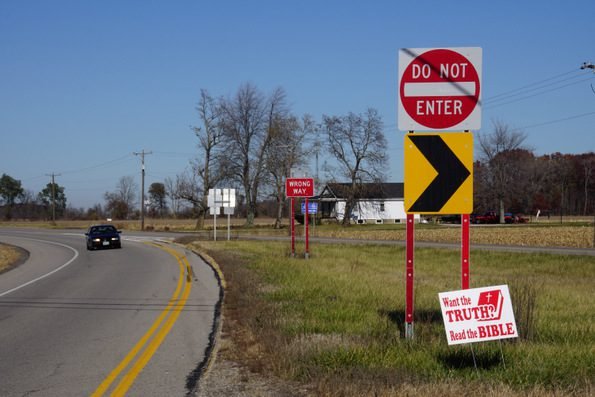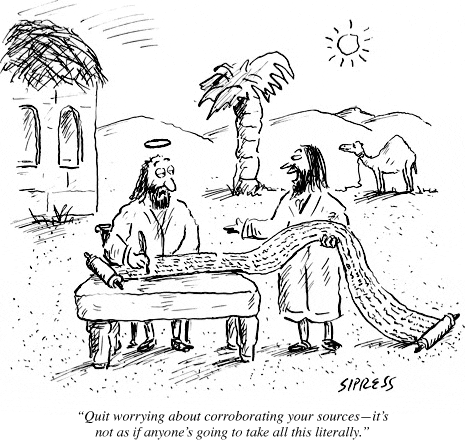
Recently, a young Evangelical pastor emailed me and asked me two questions:
- What made you leave the faith?
- Why [would] you would leave a faith that you defended for a long time?
I am frequently asked these or similar questions. Usually, I refer people to the WHY? page for answers to their questions, but there’s something about this pastor — maybe it is his age or proximity to where I live — that interests me, so I thought I would attempt to answer his questions.
I was raised in an Evangelical Christian home. From the time I was a child until I was fifty years old, I attended church every time the doors were open. Saved at the age of fifteen and called to preach two weeks later, I was a devoted follower of Jesus Christ. Imperfect, to be sure, the bent of my life was towards holiness (without which no man shall see God).
At the age of nineteen, I moved to Pontiac, Michigan to enroll in classes at Midwestern Baptist College — an Independent Fundamentalist Baptist (IFB) institution. While at Midwestern, I met Polly, and two years later we married. Polly and I spent the next thirty years faithfully serving Jesus. Whether between churches or pastoring them, our lives revolved around the ministry (for good or ill). If I counted my entrance into the ministry from the first time I preached to when I deconverted, all told I preached for thirty-three years. (Unlike most of my fellow college students, I regularly preached all through school at a drug rehabilitation center in Detroit.)
After leaving Midwestern, I began a ministerial journey that took me to churches in Ohio, Texas, and Michigan. While I entered the ministry as an Independent Fundamentalist Baptist, my path later led to ministry opportunities at Southern Baptist, Christian Union, Sovereign Grace Baptist, and Non-denominational churches. Along the way, we were blessed with six children, including a daughter with Down syndrome.
Fast forward to 2004. I decided that I was done with the ministry. The reasons were many, but not the focus of this post. Suffice it to say, these reasons played an insignificant part in my loss of faith. Polly and I decided that we were at a place in life where we wanted to help a congregation without being its pastor. We spent the next four years visiting churches in Ohio, Arizona, California, Michigan, and Indiana. We cast a wide theological net, but after visiting over one hundred churches, — attending some of them for months — we concluded that the only difference between the churches was the name over their doors. After buying in home here in Ney in 2007, we primarily attended mainline churches — a sign of our increasingly liberal politics.
As my politics and theology evolved, I asked myself what it was I truly believed? What were the non-negotiables of my life? This led to me carefully and comprehensively reexamining my political and theological beliefs — a process that continues to this day. Polly and I spent countless hours talking about our beliefs. I read aloud to Polly passages from books written by men such as Dr. Bart Ehrman. We talked about what it was we really believed about the Bible. These discussions, and my continued investigation of core Christian doctrines, led me to conclude that the central claims of Christianity were false. Teachings that were once dear to me, no longer made sense. (Please see The Michael Mock Rule: It Just Doesn’t Make Sense.) On the last Sunday in November, 2008, Polly and I attended church for the last time.
These days, I self-identify as an agnostic atheist. Polly is an agnostic, indifferent, and, at times hostile, to organized religion. Our life experiences were very different — even in the ministry — so it should come as no surprise that what motivated our deconversions might be different. Same zip code, to be sure, but different journeys. I am the intellectual of the family. I spent most of my life reading, studying, and preaching the Bible. My experiences are necessarily different from Polly’s, and that’s why our reasons for leaving Christianity vary.
Let me conclude with answering this pastor’s second question: Why [would] you would leave a faith that you defended for a long time?
I am sure this young preacher struggles to understand why I would leave something I dedicated my life to for so many years. Makes sense, right? Most men or women who leave the ministry do so when they are young or youngish. They enter the ministry and find out it is not what it is cracked up to be (and boy, it’s not!) or they had some sort of crisis of faith, and after a few years they decided the pastorate was not for them.
It is rare for men or women to leave the ministry in their 50s. It happens, but not very often. Why are older people hesitant to leave the ministry? Two things come to mind:
- Commitment bias, also known as the escalation of commitment, is the tendency to remain loyal to a previous decision, behavior, or course of action, even when it leads to negative outcomes. This often occurs as a result of a desire for consistency with one’s past words and actions, especially when that commitment was made publicly.
- Sunk Cost Fallacy, the phenomenon whereby a person is reluctant to abandon a strategy or course of action because they have invested heavily in it, even when it is clear that abandonment would be more beneficial.
I struggled with these things too. I had spent my entire life in the church. I had spent most of my adult life pastoring churches. Polly, a Baptist preacher’s daughter, and I had committed ourselves to the work of the ministry, regardless of financial renumeration. Both of us, at one time or another, worked outside of the church to provide for our family. Not one time did we doubt that this was God’s will for us — until we did. How could we throw everything away? For what? Atheism?
Only those who have walked in our shoes can understand and appreciate our emotional struggles with leaving the ministry and our later deconversion. Many a tear was shed before we walked away. We asked ourselves, Are we sure? What if we are wrong? Do we really want to throw in the towel and walk away? Does this mean we wasted our lives in the ministry? Wouldn’t it be better for us to fake it — it’s not hard — for the sake of family and social connections? What would we do if we weren’t in the ministry?
While the struggles in the dark of night were painful and real, I eventually concluded that I had to be honest: I no longer believed the Bible was the Word of God. I no longer believed the central claims of Christianity. This meant I wasn’t a Christian in any meaningful sense of the word. (Some Baptists think I am just backslidden, and I am still a Christian. This is absurd.) Truth mattered more to me than the ministry and our Evangelical way of life. This was true when I was a Christian, and it is true today. I am open to having my beliefs challenged, albeit I haven’t heard a new or persuasive argument for Christianity (or any other religion) in years. Ecclesiastes says that there is nothing new under the sun, and that is especially true when it comes to Christianity. I am confident that no new evidence will be forthcoming; so much so, that I am, when it comes to the Christian deity, an atheist. To paraphrase the book of Daniel, I have weighed Christianity in the balance and found it wanting.
Do I miss the ministry? You bet. I miss preaching, teaching, and ministering to others, but whatever yearning I may have, it cannot overcome my desire to know and live the truth. While there was certainly an emotional component — how could there not be? — to my deconversion, the primary reasons for my loss of faith were intellectual in nature. I desperately looked for a place to stop on the proverbial slippery slope, but I slid all the way to the bottom, and, in the end, I concluded I was no longer a Christian. And seventeen years later, I remain an unbeliever. Labeled an apostate, reprobate, or follower of Satan, I am routinely pilloried by God’s chosen ones, ever present reminders of Evangelicalism’s ugly underbelly. If I had any doubts about the veracity of Christianity, I no longer do, having experienced seventeen years of character assassination, threats of violence, and attacks on my family.
Please leave any questions you might have or email them to me. I will do my best to answer them.
Bruce Gerencser, 68, lives in rural Northwest Ohio with his wife of 47 years. He and his wife have six grown children and sixteen grandchildren. Bruce pastored Evangelical churches for twenty-five years in Ohio, Texas, and Michigan. Bruce left the ministry in 2005, and in 2008 he left Christianity. Bruce is now a humanist and an atheist.
Your comments are welcome and appreciated. All first-time comments are moderated. Please read the commenting rules before commenting.
You can email Bruce via the Contact Form.







